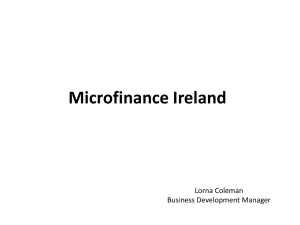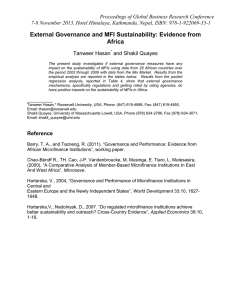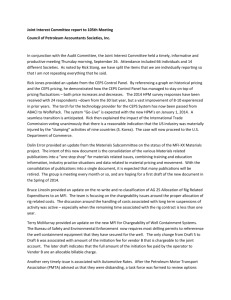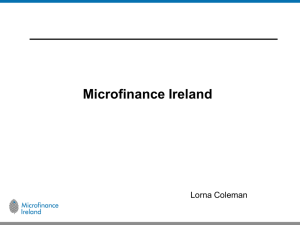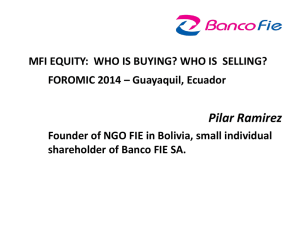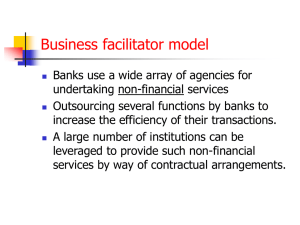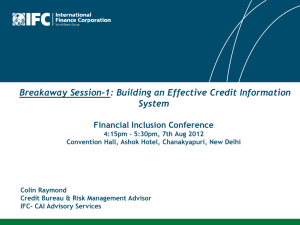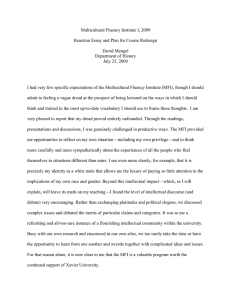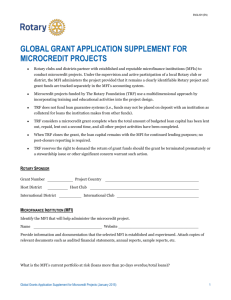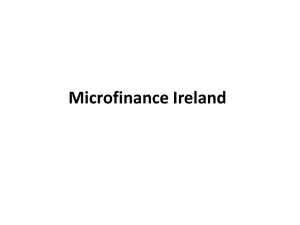Research Note - Consumer Protection
advertisement
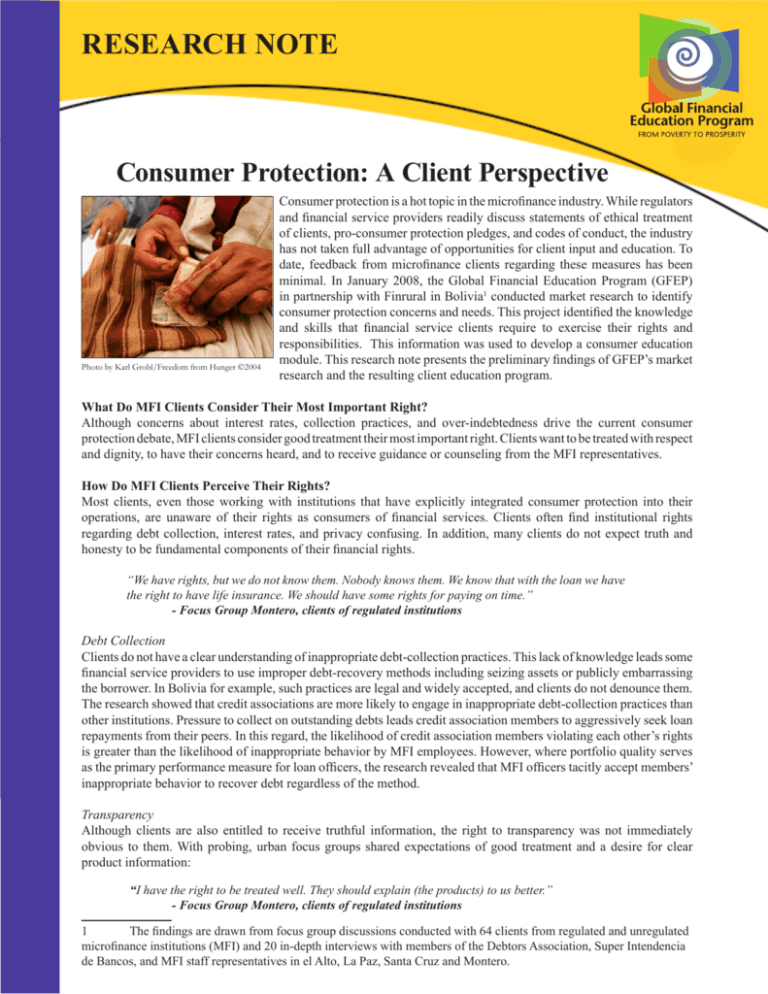
RESEARCH NOTE Consumer Protection: A Client Perspective Photo by Karl Grobl/Freedom from Hunger ©2004 Consumer protection is a hot topic in the microfinance industry. While regulators and financial service providers readily discuss statements of ethical treatment of clients, pro-consumer protection pledges, and codes of conduct, the industry has not taken full advantage of opportunities for client input and education. To date, feedback from microfinance clients regarding these measures has been minimal. In January 2008, the Global Financial Education Program (GFEP) in partnership with Finrural in Bolivia conducted market research to identify consumer protection concerns and needs. This project identified the knowledge and skills that financial service clients require to exercise their rights and responsibilities. This information was used to develop a consumer education module. This research note presents the preliminary findings of GFEP’s market research and the resulting client education program. What Do MFI Clients Consider Their Most Important Right? Although concerns about interest rates, collection practices, and over-indebtedness drive the current consumer protection debate, MFI clients consider good treatment their most important right. Clients want to be treated with respect and dignity, to have their concerns heard, and to receive guidance or counseling from the MFI representatives. How Do MFI Clients Perceive Their Rights? Most clients, even those working with institutions that have explicitly integrated consumer protection into their operations, are unaware of their rights as consumers of financial services. Clients often find institutional rights regarding debt collection, interest rates, and privacy confusing. In addition, many clients do not expect truth and honesty to be fundamental components of their financial rights. “We have rights, but we do not know them. Nobody knows them. We know that with the loan we have the right to have life insurance. We should have some rights for paying on time.” - Focus Group Montero, clients of regulated institutions Debt Collection Clients do not have a clear understanding of inappropriate debt-collection practices. This lack of knowledge leads some financial service providers to use improper debt-recovery methods including seizing assets or publicly embarrassing the borrower. In Bolivia for example, such practices are legal and widely accepted, and clients do not denounce them. The research showed that credit associations are more likely to engage in inappropriate debt-collection practices than other institutions. Pressure to collect on outstanding debts leads credit association members to aggressively seek loan repayments from their peers. In this regard, the likelihood of credit association members violating each other’s rights is greater than the likelihood of inappropriate behavior by MFI employees. However, where portfolio quality serves as the primary performance measure for loan officers, the research revealed that MFI officers tacitly accept members’ inappropriate behavior to recover debt regardless of the method. Transparency Although clients are also entitled to receive truthful information, the right to transparency was not immediately obvious to them. With probing, urban focus groups shared expectations of good treatment and a desire for clear product information: “I have the right to be treated well. They should explain (the products) to us better.” - Focus Group Montero, clients of regulated institutions The findings are drawn from focus group discussions conducted with 64 clients from regulated and unregulated microfinance institutions (MFI) and 20 in-depth interviews with members of the Debtors Association, Super Intendencia de Bancos, and MFI staff representatives in el Alto, La Paz, Santa Cruz and Montero. There are three reasons for this on-going imbalance between the value of full consumer disclosure and the lack of awareness of clients’ rights. First, MFI employees usually do not provide the client with all the information necessary to evaluate a range of products from a variety of providers. Instead, the MFI employees provide information on product terms focused on selling a specific product. Second, the low financial literacy levels of many clients decrease their understanding of the product. Worried that the MFI might deny their loans, and embarrassed because they do not understand the product, clients avoid asking questions. Third, misconceptions about interest rates and the concept of percentages undermine the clients’ right to transparency and ability to understand information provided to them. The result of these three factors is that clients sign contracts without realizing the real cost of their loans. “Two years ago, I took out a loan for US $6,000. When they told me about the loan, I did not ask any questions. I just signed. Then, I went home and with my husband, I realized that in the 4 years I will have to pay back a total of US $12,000. What could I do? It was too late. I wish I would have known the total cost of the loan.” - Focus Group La Paz, clients of regulated institutions Product Suitability Clients are often victims of misrepresentations of products and aggressive marketing tactics in highly competitive markets such as Bolivia. An example of product distortion emerged in a discussion of a MFI savings account there. A lender offered clients with saving accounts the opportunity to participate in a weekly lottery for 2,000 bolivianos without disclosing a requirement for a minimum account balance. Those who did not maintain the required minimum balance ended up losing their money. However, unaware that truth and honesty are fundamental components of financial services, the clients did not perceive this as a violation of their rights. Privacy The research indicated that clients are not concerned about their right to privacy. Consumers assume that the MFI needs their personal information to evaluate their application, and they do not worry about how this information might be shared with or used by others. Recourse The Super Intendencia is the only channel open to consumers wishing to make a claim against a microfinance service provider. This is a limited avenue of recourse and rarely used. Clients can only make claims against regulated institutions, and in order to use this mechanism, clients must be literate. Additionally, clients do not trust the government to resolve financial problems. Often they prefer not to raise issues of impropriety for fear that the financial provider will deny them a loan, or it will damage their relationship with the institution. No other legal alternatives exist to protect clients against the abuses of a financial institution. Delivering Consumer Education According to MFI representatives, most institutions support consumer protection principles. They agree that the most effective way to ensure that clients become informed consumers is to provide financial education. The consensus among financial institutions is that they must educate their clients about both their financial rights and their financial responsibilities. “I think that such a module is important because I guess it will be about rights but also responsibilities. A lot of people borrow money without knowing the interest rate or without analyzing the consequences of the loan. They must know their rights but also their responsibilities.” - MFI Representative, La Paz The Global Financial Education Program The Global Financial Education Program has incorporated the results of this market research into the design of a consumer protection module. With this module, microfinance clients will gain knowledge and skills vital to protect themselves and in the process become better clients. This first version of the module was pilot tested in March 2008. Once refined, it will be tested again in several other countries. The result will be an easily adaptable generic module suitable for a range of markets. For more information about the consumer protection module and other financial education modules please contact the Global Financial Education Program at financialed@mfopps.org. Prepared by Maria Perdomo, Freedom from Hunger, May 2008. www.globalfinancialed.org www.microfinanceopportunities.org www.freedomfromhunger.org The Super Intendencia is the regulatory entity of financial institutions. The legal recourse available to clients is called the SARC (Sistema de Atención a Reclamos y Consultas ). Clients lodge complaints in writing to the Super Intendencia.


